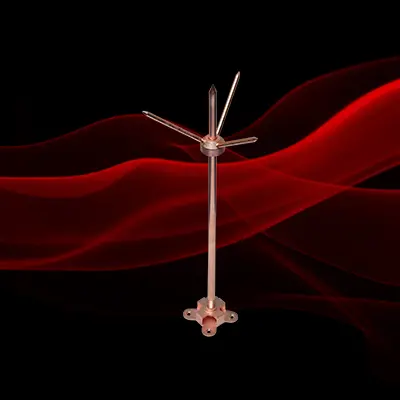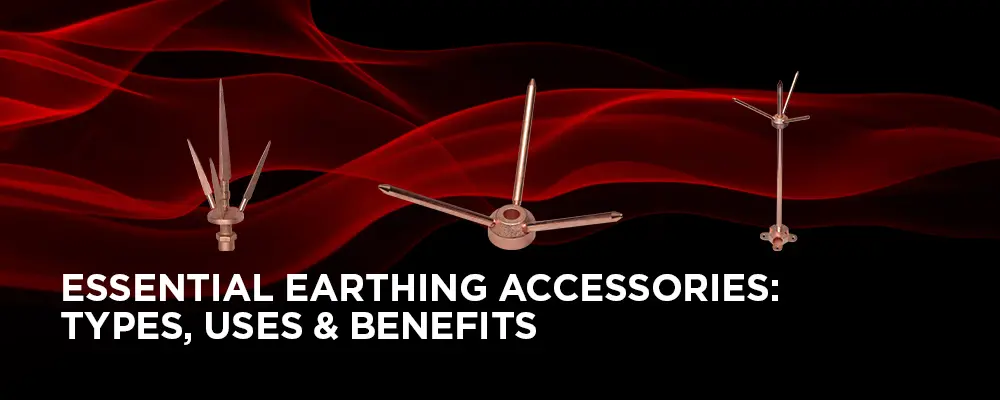
Electrical earthing is a critical aspect of ensuring electrical safety in homes, industries, and commercial spaces. It helps protect people and equipment from electric shocks by providing a safe path for fault currents to dissipate into the ground. Understanding electrical earthing methods, components, and accessories is essential for maintaining a safe and efficient electrical system. This comprehensive guide will help you grasp the essentials of electrical earthing and highlight the importance of using quality accessories for reliable performance.
Electrical earthing refers to the process of connecting electrical installations to the earth’s conductive surface to prevent electric shocks, fires, and equipment damage. It diverts excess electrical charges safely into the ground, minimizing hazards.
The primary objectives of electrical earthing include:
- Ensuring safety by preventing electric shocks.
- Providing a stable voltage reference point.
- Protecting electrical equipment from surges and lightning strikes.
A well-designed earthing system reduces the risk of electrical hazards and enhances the overall performance of the electrical network.
There are several earthing methods used to enhance electrical safety tips and protect installations from potential risks. Common earthing types include:
1. Plate Earthing:
- Utilizes copper or galvanized iron plates buried in the ground to disperse fault currents safely.
2. Pipe Earthing:
- Involves inserting a galvanized steel pipe vertically into moist soil to provide effective grounding.
3. Rod Earthing:
- Employs an earthing rod made of copper or steel driven into the ground to ensure effective fault current dissipation.
4. Strip or Wire Earthing:
- Utilizes copper or galvanized iron wires connected directly to the earth electrode to distribute current safely.
5. Earthing Pole Systems:
- Commonly used in electrical installations to provide a secure grounding system for transmission lines and industrial setups.
Choosing the right types of earthing systems is crucial for ensuring effective electrical grounding and enhancing overall electrical safety tips.
A reliable earthing system comprises several vital components that work together to ensure efficient grounding. These include:
1. Earth Electrode:
- Typically made of copper, steel, or galvanized iron, these electrodes help discharge fault currents into the soil.
2. Earthing Rod:
- An essential component used to create direct contact with the earth’s surface for effective grounding.
3. Earthing Wire or Strip:
- Copper or galvanized iron wires that connect electrical installations to the earth electrode.
4. Earthing Pit and Chamber:
- A designated area where the electrode is installed, often filled with conductive soil or compounds for enhanced performance.
5. Earthing Pole:
- A structural element designed to provide a stable grounding system in larger installations.
Each component plays a vital role in maintaining a secure and efficient earthing system.
To ensure durability and efficiency in your electrical earthing setup, using high-quality accessories is essential. Key accessories include:
1. Earth Clamps:
- Ensure secure connections between conductors and earth rods.
2. Lightning Arresters:
- Protect electrical systems from high-voltage surges caused by lightning strikes.
3. Inspection Pits:
- Facilitate easy monitoring and maintenance of the earthing rod and electrode.
4. Earth Electrodes:
- Provide a stable grounding point for electrical installations.
5. Earthing Conductors:
- Copper or aluminum conductors that ensure effective fault current distribution.
By investing in durable, certified accessories from trusted suppliers like Atlas Metal Industries, you can achieve a safer and more efficient earthing system.
Mistakes during electrical earthing installation can compromise safety and lead to costly repairs. Common errors include:
- Incorrect Electrode Placement: Placing the earthing rod in dry or rocky soil reduces conductivity. Ensure proper soil conditions for enhanced grounding.
- Inadequate Depth of Rod Installation: Insufficient depth limits the electrode’s ability to dissipate fault currents effectively. Follow recommended depth guidelines for best results.
- Neglecting Corrosion Protection: Corrosion can weaken earthing rods and electrodes over time. Using corrosion-resistant materials ensures durability.
- Ignoring Routine Maintenance: Regular inspections are crucial for maintaining a functional earthing system. Periodic testing ensures optimal performance.
Avoiding these mistakes enhances electrical safety and improves system reliability.
Choosing premium earthing accessories is critical for achieving safe and long-lasting grounding systems. Reliable components enhance electrical conductivity, minimize energy loss, and reduce maintenance efforts.
Atlas Metal Industries, a leader in electrical components manufacturing, offers top-quality accessories that comply with international safety standards. Their precision-engineered solutions ensure reliable electrical earthing performance in residential, commercial, and industrial setups.
Proper electrical earthing is essential for ensuring the safety and stability of your electrical installations. By selecting appropriate earthing methods, investing in durable earthing accessories, and avoiding common installation mistakes, you can maintain a safe and efficient electrical system. Looking for top-quality electrical earthing accessories? Contact Atlas Metal Industries for the best solutions!
For inquiries, reach us at sales@atlasmetalind.com or call us at +91-288 2730 944.
How often should I inspect my electrical earthing system?
Routine inspection every 6 to 12 months is advisable to ensure optimal performance and maintain electrical safety tips.
Are copper earthing rods better than galvanized steel rods?
Yes, copper earthing rods offer superior conductivity and corrosion resistance, making them a preferred choice for long-term performance.
Why is an earthing pole important in industrial setups?
An earthing pole ensures stable grounding for high-voltage equipment, protecting against electrical faults and improving safety.
How can I identify a quality earthing rod?
Look for certified products with corrosion-resistant coatings and proper dimensions to meet industry standards.
Why choose Atlas Metal Industries for electrical earthing accessories?
Atlas Metal Industries provides top-quality earthing rods, clamps, conductors, and other accessories that ensure safe and effective grounding systems.



